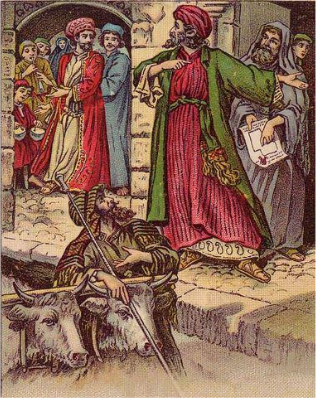The Faithful Servant and the Evil Servant
Luke 12:41–48, also Matthew 24:45–51
And Peter said to Him, Lord, sayest Thou this parable to us, or even to all? And the Lord said, Who then is that faithful and prudent steward, whom the lord shall appoint over his household, to apportion to them their measure of wheat in due time? Happy is that servant whom his lord at his coming shall find so doing. Truly I say to you that he will appoint him over all his belongings.
But if that servant5 shall say in his heart, “My lord delays to come,” and shall begin to strike the boy-servants and maids, and to eat and to drink and be drunken, the lord of that servant shall come in a day that he does not expect him, and in an hour which he does not know, and will divide him in two, and will put his part with the unbelieving6.
And that servant who knew his lord’s will, and did not prepare, nor do according to his will, shall be beaten with many stripes. But he who did not know, but did things worthy of stripes, shall be beaten with few. And everyone to whom much has been given, from him much will be sought; and to whom they have committed much, of him they will ask all the more.
In this parable, the Lord is urging us to live a good life.
AC 4422:2e. These are words of exhortation to those in the church, that they should be in the good of faith, and that if not they must perish.
Servant
AR 3:3. By servant is meant he who teaches Divine truth... [especially] those who are in truths from good, or in faith from charity, because these can teach from the Lord, that is, the Lord can teach and minister through them.... In the opposite sense, by servants are meant those who serve the devil; these are in a state of servitude itself. But those who serve the Lord are in a state of liberty, as the Lord also teaches (John 8:32–36).
Eat and drink and be drunken
AE 617:2. “To eat” and “to drink” signify to nourish oneself spiritually, consequently to appropriate to oneself good and truth, “to eat” signifying to appropriate to oneself good, and “to drink” to appropriate to oneself truth.... To be nourished spiritually is to be instructed and imbued, consequently to know, to understand, and to be wise. Unless a man enjoys this nourishment together with the nourishment of the body, he is not a man but a beast. And this is why those who place all delight in feastings and banquetings and daily indulge their palates are dull in spiritual things, however they may be able to reason respecting the things of the world and of the body. Therefore, after death they live a life that is beastly rather than human, for instead of intelligence and wisdom they have insanity and folly.
The lord shall come in an hour he does not know.
AE 194:3–4. [This] means not only that one is ignorant of the time of death, but also of the state of life at that time which will continue to eternity; for such as the state of man’s past life is, even to the end, such he remains to eternity.... It should be known that man remains to eternity such as his whole life is, even to the end, and by no means such as he is at the hour of death. Repentance at that time with the evil is of no avail, but with the good it strengthens.
That servant who knew his lord’s will and did not prepare
AC 7790. When those who have infested the upright are damned, all truth Divine departs from them, for they are then in the state of their evil, and evil rejects and extinguishes all truth Divine. Until then, previous to their damnation, they were indeed acquainted with the truths of faith, but nevertheless they had no truths in them, for truths were then in their mouth, but not in the heart. And therefore, when they have been vastated as to these truths, evil remains, and then also the falsity of evil comes forth to view which had lain hidden within them. For although they had professed truths, they were nevertheless not in truths, but in falsities. Moreover, the very profession of truth did not descend from its own beginning, namely, from good, but from evil. For they had made their profession for the sake of gain, honors, and reputation, thus for the sake of themselves and the world. The truths which descend from such a beginning adhere on the surface, and therefore when they are being vastated, the truths fall off like scales, and when they fall off, they leave places that are foulsmelling and putrid from the falsities which exhale from the evils there. Such is the lot of those who have known the truths of faith, and yet have lived contrary to them....
5 Matthew 24:48 has “that evil servant....”
6 Matthew 24:51 has “with the hypocrites, where there will be weeping and gnashing of teeth.”
Questions and Comments
- How can we be faithful and prudent stewards? (See DP 210, quoted on pages 16–17 of Week 3.)
- AR 3: “Servants” are those through whom the Lord can teach and minister to others. Can parents and friends be “servants” in this sense, nourishing their children and friends spiritually?
- AE 194: Deathbed repentance with the evil is of no avail, but with the good it strengthens, if we have practiced repentance regularly in life. Why is it essential that we do not know when we are going to die?
- AC 7790: How can we beware of having truths only in our mouths but not in our hearts?
| previous |  |
next |
|---|


